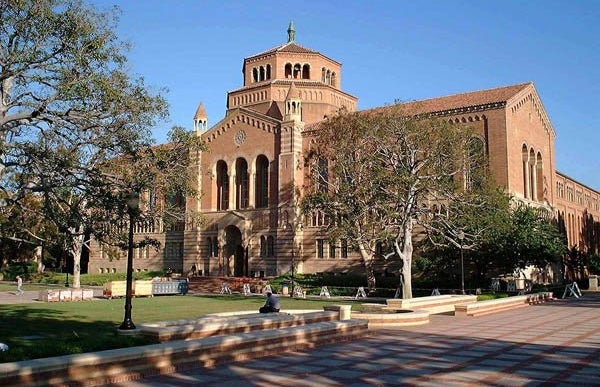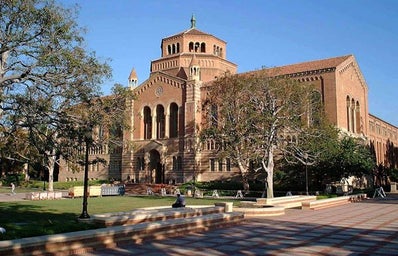Being a minority adds a new dynamic to any experience you’re in, including the college experience. Therefore, in honor of Asian American and Pacific Islander Pride Month, Her Campus at UCLA talked to eight AAPI Bruins to gain insight into their experiences at UCLA. We asked about clubs, experiences and overall thoughts about campus. Here is what they had to say:
Anuradha Srikanth is a third-year physiological science student with a minor in film. She’s Indian American and has overall felt accepted at UCLA. However, her college experience has not been all fairy tales and rainbows. When asked if she’s experienced any racism or discriminatory remarks, she shared the following:
“… One of my freshman year roommates and her friend deeply disliked me because I was Asian. My former roommate and her friend routinely commented on the number of Asian-American students, how they felt ‘outnumbered,’ and how everywhere they looked they’d see ‘Asian, Asian, Asian.’ When I confronted my roommate’s friend about his racism, he claimed that it was because he was bullied by Asian Americans in high school. On one occasion, this same person randomly announced in front of me and one of my friends (who was also Asian) that the one race he wouldn’t date is Asian. This was the same friend that my former roommate and her friend would call ‘jaundiced.’ He then proceeded to ‘correct’ himself and specified Filipinos, as if that made what he said any better. My former roommate and her friend had an issue with every little thing I did, calling me hypocritical for not wanting strange people in my room at 3:30 a.m. and just generally being rude and dismissive. Also, I just remembered that they particularly hated Feast and would always suggest going to Feast when my friend (the one they called ‘jaundiced’) would ask to go to a dining hall together.”
Luckily, Srikanth was able to overcome these remarks and find a community of friends. When asked if she had any advice for new AAPI Bruins, she said, “Put your foot down when it comes to racism and microaggressions. I wish I stood up to my former roommate and her friend, and I wish I said something to my RA. They made me feel unwanted and I was so close to transferring schools.” She is now the new president of the Film and Photography Society, and encourages fellow AAPI students to join: “We have many members who identify as AAPI and want to encourage AAPI students to explore filmmaking which is an industry that AAPIs have been historically excluded from and underrepresented in.” Srikanth is not only helping representation as an Asian American Bruin pursuing the film industry but as a queer Bruin. She asked me to make sure this article gave love to queer AAPI students. So, I wanted to make sure I included a message to queer AAPI Bruins that we see you, we hear you and you deserve to be represented.
Pursuing a similar career to Srikanth is Annika Dudley, third-year music history and industry student with a film minor. She is mixed with Filipino, Black and White heritage, and has had a relatively “chill” experience as an AAPI Buin. While she wishes to meet more Filipinos, she has found a community at the Cultural Affairs Commission (CAC) and says “working with a fellow AAPI film student and being a member of CAC has helped me appreciate uplifting and amplifying diverse voices and stories.” She encourages new AAPI Bruins to get involved with extracurriculars: “Join a club! I wish I joined Samahang Pilipino (a Filipino cultural club) earlier because I would have met people early on.”
Maddie Wang also emphasized the importance of joining clubs. A third-year Chinese MIMG major, she mainly wrote about clubs on her survey. When asked for advice to new AAPI Bruins, she wrote, “If you want to get more in touch with your culture or if you want to meet people from similar backgrounds, cultural clubs are a great start. These clubs really help when you start to feel nostalgic about traditions that are hard to participate in when you’re far away from home. Westwood also doesn’t have too many options for Asian food so that is something to consider (still better than other places).”
Between her clubs and classes, UCLA has also been an overall accepting place for Wang and she said it sometimes feels like a bubble from the outside world: “Ultimately, I feel extremely lucky to be attending a college where there is such a large population of AAPI and where people are somewhat educated about other cultures. I think the hardest thing to remember is that UCLA is a little bit of a bubble and that just leaving campus will lead to different treatment…I’m extremely proud of my Asian heritage and I grew up in Chinese culture. The Association of Chinese Americans and Asian Pacific Health Corps have been huge parts of my college experience by letting me meet a lot of people, letting me contribute to the Asian community, and keeping me connected to my culture”
Many others have also found a community at UCLA and find it to be a safer and more accepting place than the outside world. It has been for Elizabeth Lu, a third-year communications student: “[My college experience has] been great! Coming from a predominantly white suburb, I grew up always trying to erase my culture by refusing to learn Chinese, trying to hold my eyelids to have a crease and feeling embarrassed to let people come over to my house out of fear they’d find my parents’ accents ‘weird.’ I never had pride in being Asian American until I came to UCLA, where essentially all my friends are Asian. I finally have people who share the same experiences with microaggressions and racism growing up as I did. It’s very refreshing to have a community of people with the same background as me and being able to have conversations about what it’s like to be Asian American is something I wouldn’t have been able to have if I hadn’t come to UCLA.”
However, for some students, UCLA has been a tough place to navigate. Ellie Chen is a fourth-year communication student with a film and classics minor. She is Chinese and her experience at UCLA has been “a mixed bag — [I] definitely have experienced microaggressions and a few less-than-savory circumstances but it’s been good seeing diversity and representation among the student body. I haven’t personally fit in with lots of fellow AAPI groups though — I’m not considered Asian enough to fit in with the ‘Asian student crowd’ but not American enough to fit in with them either.” Chen doesn’t have any advice for new AAPI Bruins right now, but says at UCLA, “It’s been very informative learning about the sociopolitical culture with regards to different demographics and our identities, but also pretty disheartening to see more and more the institutionalized and socialized stereotypes and prejudices against AAPI and other BIPOC communities.”
Keila Kimura, a third-year EEB student has also noticed UCLA can be a great but complex place to navigate: “Overall I feel grateful for the sense of community within the AAPI community but also. as a mix of East and Southeast Asian, I feel like I get to see how there is a big difference in the treatment of the two groups within the community. I feel like I’m not good enough for either half of my ethnic background while still feeling the most at home in a group of people with shared experiences.”
Half Filipino, and half Japanese, it took a while for Kimura to settle in on campus, but she recommends clubs such as Asian Pacific Health Corps (APHC) and Dear Asian Youth (DAY). Overall, being an AAPI student in college has “given me a sense of community and a place where I can feel my experiences are valid because I relate to other people’s experiences. I also was able to find my current boyfriend through being AAPI at UCLA.” For new Bruins, she advises, “You’ll find your own eventually. Imposter syndrome is real and valid but you’ll settle in. Don’t be afraid to jump into your interests and surround yourself with people you enjoy being around.”
A peer of Kimura, Jack Sato also chipped in on his experience at UCLA. Half Thai and half Japanese, he’s a fourth-year biochemistry student who says, “As an AAPI student, I’ve fully devoted myself to diving headfirst into the culture that backs me and have made many connections, colleagues and friends through them. Every day I learn from the experience that comes with being an AAPI student and hope that others feel just as comfortable living in their cultures as much as I have.” His favorite clubs are Kendo and the Japanese Student Association, and he encourages new Bruins to “feel free to explore and discover more about your cultures and other cultures during your time at UCLA. There is no time like now.”
Finally, Jaime White, a second-year English student and community engagement and social change minor, shared a unique perspective as an AAPI Bruin. She’s half Japanese and half White, and lucky to not have experienced much racism. But, she suspects it’s because, at first glance, many people don’t think she is an AAPI student. She was gracious enough to share not only her story but also her mother’s: “My mother attended UCLA decades ago. She majored in history and went on to pursue law. She’s told me that white peers frequently approached her around campus and offered to teach her English, just because she is Asian. She found this very insulting, as a third-generation Japanese American whose native language is English.” Both White and her mother’s experiences are valid and show that each AAPI student at UCLA has a unique story.
This AAPI month, it is important we sit with our peers and listen to them about their thoughts, experiences and anything on their minds. I am so grateful to have learned the stories of these 8 amazing Bruins and thank them all for taking the time to share with HC at UCLA. Happy AAPI Pride Month, and may we challenge ourselves to learn every day.


